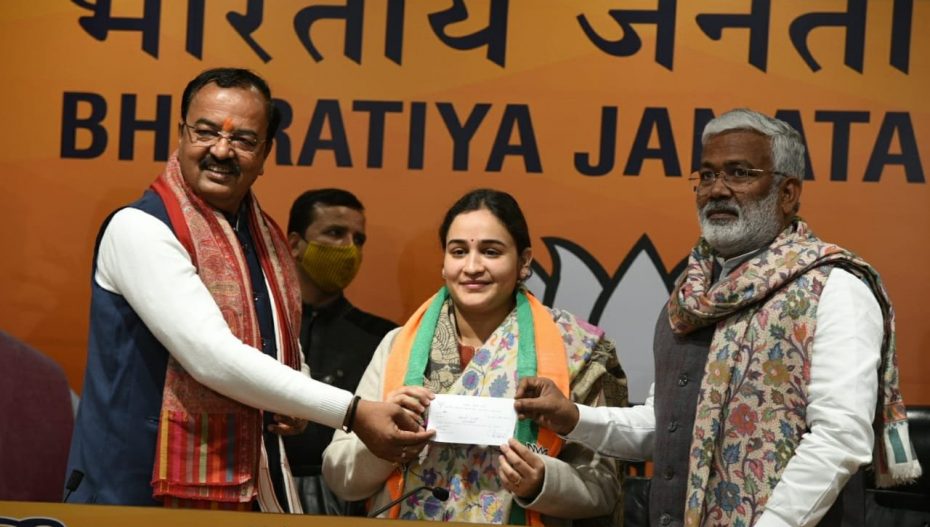Nothing delights the RSS-BJP more than splitting political estates and breaking up legacy families. It’s about creating splinter “parivars” (families) rather than repose power and command in one central figure, the patriarch or the matriarch or the heir, as with the Samajwadi Party (SP) of Uttar Pradesh, which is helmed by Akhilesh Yadav.
This morning, the BJP believed it achieved a coup of sorts when Aparna Yadav, Mulayam Singh Yadav’s daughter-in-law and Akhilesh’s sister-in-law, joined the party in the presence of Keshav Prasad Maurya, UP’s deputy chief minister, and Swatantra Dev Singh, the state BJP president and appropriately paid obeisance to Prime Minister Narendra Modi and “nationalism”. The BJP had been on the job of stoking Aparna’s political ambitions and ensnaring her for a long time.
Aparna had contested the 2017 assembly elections from Lucknow Cantonment and lost to the BJP’s Rita Bahuguna Joshi, who is demanding a ticket for her son Mayank Joshi this time from the same constituency. Sources say Aparna would not have joined without the assurance of a ticket from Lucknow Cantt. Although her defection is being depicted as comeuppance for the departures of significant backward caste leaders from the BJP to the SP, Aparna does not have backward caste provenance.
She is the daughter of Arvind Bisht, a former Lucknow journalist, and the family is from Uttarakhand’s Garhwal region. Bisht was appointed as an information commissioner in the UP government when Akhilesh Yadav was the chief minister. Despite Akhilesh’s reluctance to give a ticket to his sister-in-law, his father Mulayam Singh Yadav prevailed on him to do so, using a political argument.
Lucknow Cantt has a large number of migrants from the Uttarakhand hills and their votes matter. Rita Joshi, the daughter of the legendary politician Hemwati Nandan Bahuguna, is also from Garhwal but married to a person from the Kumaon region.
The power balance in the Yadav “parivar” got unsettled when in 2017, Mulayam did not want to declare Akhilesh as the CM candidate, despite Akhilesh being the incumbent. Mulayam was pressured by his second wife, Sadhna Gupta (Akhilesh was born to his first wife, Malti Devi) to prop up their son, Prateek or Aparna, Prateek’s wife. Prateek, a fitness freak, has no manifest political aspirations but Aparna was always ambitious and periodically let on that they should have a claim over the SP.
In the vortex which engulfed the SP in 2017, Mulayam sided with his second wife who bolstered her position by getting Mulayam’s younger brother, Shivpal Singh Yadav and the late Amar Singh to support her “bahu”. This cabal shared an antipathy towards Akhilesh who drew his sustenance from his maternal uncle and Rajya Sabha MP, Ramgopal Yadav. Akhilesh won the battle within the family after yielding a ticket to Aparna but was routed in the elections.
Meanwhile, Aparna continued to be a thorn in his flesh. She called on the chief minister, Yogi Adityanath every now and then, and endorsed his policies. However, Akhilesh consolidated his standing by buying peace with Shivpal. Before the 2019 Lok Sabha polls, Shivpal had floated his own party, Pragatisheel Samajwadi Party (Lohia) which damaged the SP in the family’s fief in west-central UP and helped the BJP. Akhilesh figured out that it was no good alienating Shivpal if he had to recover ground in the districts of Firozabad, Etawah, Etah and Mainpuri, adjoining Agra.
The question is will Aparna damage the SP’s prospects? First, the cities were never SP strongholds, barring rare exceptions. It is highly unlikely that Aparna’s “influence”—if one can use the word—will spread beyond Lucknow but the BJP is bound to use her as a big campaigner against the SP. Second, can the BJP overlook Rita’s claim for herself or her son, Mayank? A source close to Rita said that she met the BJP central leaders minding UP and they assured her that her “interests” will be looked after. Rita had threatened to quit the BJP if her son was denied a ticket.
Prime Minister Modi has consistently assailed family-centered politics and to an extent, got his message across to the electorate, particularly when he framed the debate as a conflict between “namdar” (a famous name but actually denotes a sense of entitlement) and “kamdar” (a hard-worker), between those to the manor born and those, like him, who struggled to reach their positions.
Not that the BJP was averse to promoting its own dynasts like Anurag Thakur, Dushyant Singh, Poonam Mahajan, Varun Gandhi, BY Raghavendra, Jayant Sinha, Pravesh Sahib Singh Verma and numerous others. Their presence was conveniently explained away in terms of their “winnability” although each one of them capitalised on their political inheritance while campaigning.
But the political families continued to be eye-sores. The BJP tried hard to take advantage of the fissures in the Lalu Prasad “khandan” after Lalu’s sons, Tej Pratap and Tejashwi Yadav fell out. It hasn’t succeeded so far. The BJP managed to sever relations for time to come between the late Ram Vilas Paswan’s son and political heir, Chirag Paswan and his uncle, Pashupati Nath Paras.
It nearly ruptured the bond within Sharad Pawar’s family after Pawar’s nephew and the NCP’s political resource person Ajit Pawar quit to be part of a BJP government in Maharashtra. The adventure was a misadventure. Persuaded by Pawar’s wife, Ajit returned to his parent party.


















